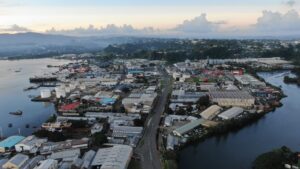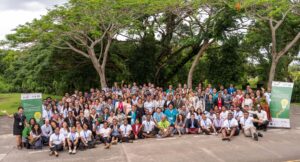Increasing cases of coronavirus in children are to be expected as the number of people testing positive for COVID-19 increases, a university panel of discussion heard.
Responding to a question with reference to the recent death of Fiji’s youngest COVID-19 victim, an 11-month-old baby, during a Fiji National University panel of discussion yesterday, epidemiologist Professor Fiona Russell said such is the nature of the Delta variant which has a load of virus that is about 1000 times more than that for any of the previous variants.
Professor Fiona who is also a translation researcher and member of the World Health Organization (WHO) Pneumococcal Conjugate Vaccine Expert Advisory group said, unlike the previous variants, Delta is highly infectious and targets anyone who is not vaccinated.
“So when you get infections in the community that are high, you also get infections and children that are high. So it’s just a very reflective sort of situation,” Professor Fiona said.
In Fiji, cases increased sparsely – from less than 100 new cases a week between April through the third week of May, then hitting the 100s through mid-week June. A week later from June end to date, weekly cases have been totalling more than 1000 a week.

Regarding the severity of the disease on children, Dr Fiona referred to UK studies that showed that those with co-morbid issues or underlying conditions were most at risk, even before the Delta variant was detected. Now with the more infectious Delta variant entering the equation, the expectations are that children with co-morbidity will be even more vulnerable.
“With regard to severity, we’ve got data, mostly from high-income countries is really very little from situations similar to Fiji. And so prior to delta, so this is what I’m saying as UK data prior to the delta in children, and so the children that were most at risk of getting a severe outcome, although it was very rare, are children who have underlying conditions such as those with problems with their immune system, and also children who have got down syndrome, children with complex neurological problems and children like that who have underlying and are vulnerable to this conditions.
“So we expect that in a situation of the delta, these children will also, of course, be potentially or would be at higher risk from Delta as well.”
Professor Fiona says the level of risk to children can be mitigated and/or avoided if early care is provided, COVID-safe protocols are adhered to and ensure more parents and eligible adults get vaccinated until safer vaccines for children are made available.
“One of the key things is having timely access to care and so making sure that parents bring in, if they have got a sick child, to make sure that they are bringing their child in to seek care in a timely sort of manner as per usual,” Dr Russel said.
“Access to care is really critical that that’s not delayed at all and also it’s recommended that Moderna has now been licensed for use in teenagers in Europe, so teenagers in Fiji With underlying conditions should really be prioritised as well because they’re the one ones who are more likely to end up with getting severe outcomes.”
Moderna is one of the few vaccines approved for use for children aged 12 and above. For those under 12, there is not any clinical trial data yet as trials are still underway. Once available, the data will need to be looked at to weigh the risk of vaccination against the benefits before any decision on its use is made.
Aside from the 11-month-old, the other known or reported case of a child contracting COVID19 in Fiji was a 7-month-old baby who was part of the Cunningham cluster in the early days of the outbreak. The baby reportedly recovered.











